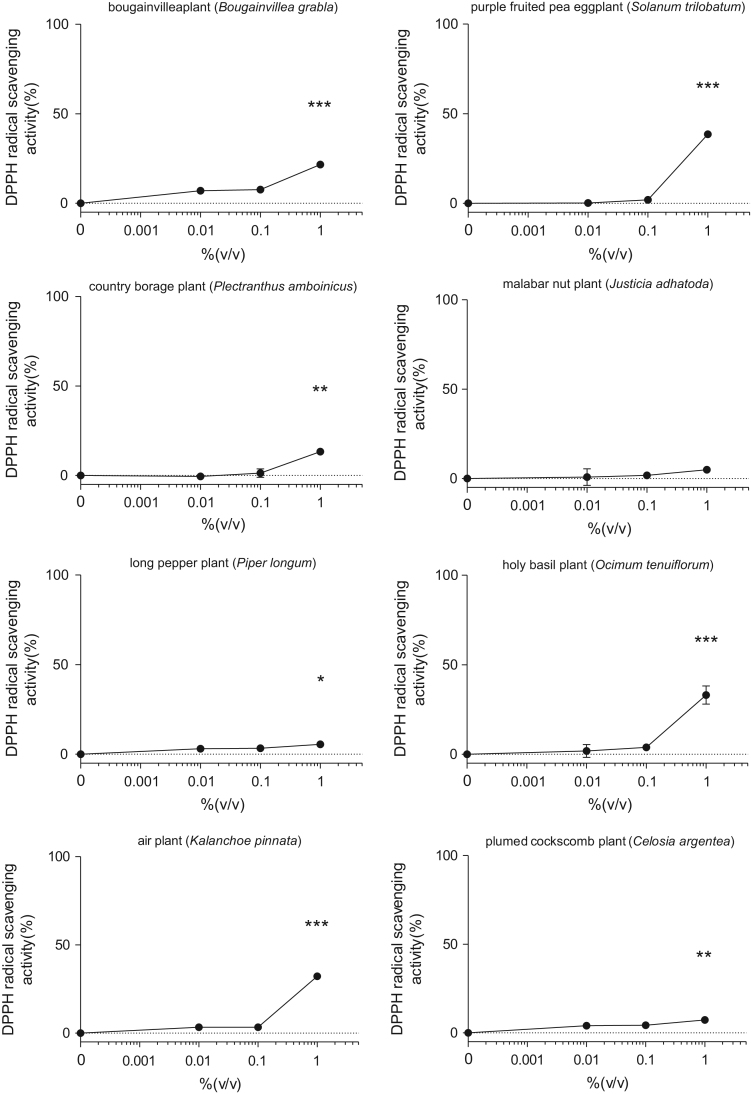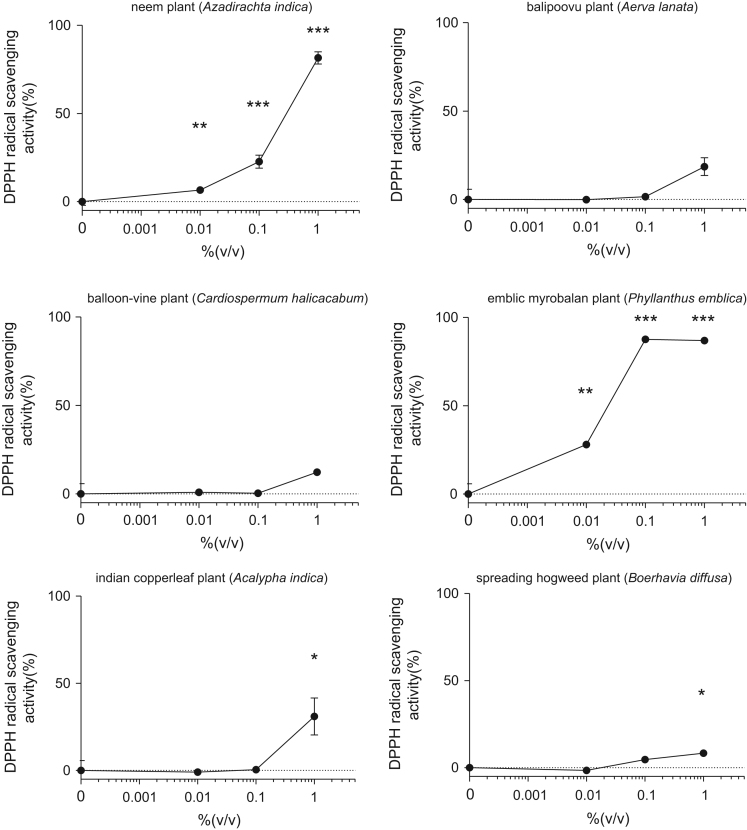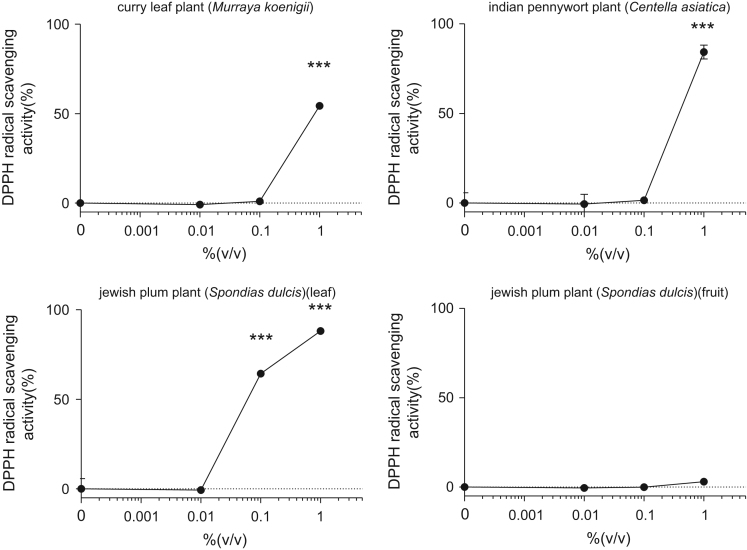Abstract
This article describes free radical-scavenging activities of extracts of several plants harvested in Sri Lanka through the 1,1-diphenyl-2-picrylhydrazyl (DPPH) assay. These plants have traditionally been used in the indigenous systems of medicine in Sri Lanka, such as Ayurveda, as described below. (English name, “local name in Sri Lanka,” (scientific name)).
bougainvillea plant, “bouganvilla,” (Bougainvillea grabla), purple fruited pea eggplant,”welthibbatu,” (Solanum trilobatum) [1], country borage plant, “kapparawalliya,” (Plectranthus amboinicus) [2], malabar nut plant, “adhatoda,” (Justicia adhatoda) [3], long pepper plant,”thippili,” (Piper longum) [4], holy basil plant, “maduruthala,” (Ocimum tenuiflorum) [5], air plant, “akkapana,” (Kalanchoe pinnata) [6], plumed cockscomb plant, “kiri-henda,” (Celosia argentea) [7], neem plant,”kohomba,” (Azadirachta indica) [8], balipoovu plant, “polpala,” (Aerva lanata) [9], balloon-vine plant, “wel penera,” (Cardiospermum halicacabum) [10], emblic myrobalan plant, “nelli,” (Phyllanthus emblica) [11], indian copperleaf plant, “kuppameniya,” (Acalypha indica) [12], spreading hogweed plant, “pita sudu sarana,” (Boerhavia diffusa) [13], curry leaf plant, “karapincha,” (Murraya koenigii) [14], indian pennywort plant, “gotukola,” (Centera asiatica) [15], jewish plum plant, “ambarella,”(Spondias dulcis) [16].
Keywords: Antioxidative activity, DPPH radical-scavenging assay, Traditional plant, Medical herb
Specifications Table
| Subject area | Biology |
| More specific subject area | Cell biology |
| Type of data | Graph |
| How data was acquired | Fluorescent microscope (SpectraMax® i3x, MOLECULAR DEVICES) |
| Data format | Analyzed |
| Experimental factors | 1,1-diphenyl-2-picrylhydrazyl |
| Experimental features | Analysis of free radical-scavenging activity through the DPPH assay |
| Data source location | Negombo, Sri Lanka |
| Data accessibility | Data are available within this article |
Value of the data
-
•
Data represent free radical-scavenging activities of extracts of several plants, and support further studies for estimating their biological effects.
-
•
These data indicate that several plants exhibit antioxidant activities and could be further investigated for their use as pharmacologic and cosmetic agents.
-
•
This article investigates biological effects of plants traditionally used in indigenous systems of medicine.
1. Data
This data article contains bar graphs showing anti-oxidative activities of several plants extracts, harvested in Negombo, Sri Lanka. Anti-oxidative activities of each plants extracts were determined free radical scavenging activity of NLE through 1,1-diphenyl-2-picrylhydrazyl (DPPH) assay. The data represent the mean ± SE values from triplicate independent experiments (*P < 0.05, **P < 0.001 and ***P < 0.001 vs. control (0.0%)).
2. Experimental design, materials and methods
All plants were harvested from a medicinal garden at the Institute of Traditional Plants (Negombo, Sri Lanka). Each plant extract was prepared using specific solvents as described below.
bougainvillea plant, “bouganvilla,” (Bougainvillea grabla), flower, 70% EtOH; purple fruited pea eggplant,”welthibbatu,” (Solanum trilobatum), shoot, 70% EtOH; country borage plant, “kapparawalliya,” (Plectranthus amboinicus), leaf ,70% EtOH; malabar nut plant, “adhatoda,” (Justicia adhatoda), leaf, 70% EtOH; long pepper plant,”thippili,” (Piper longum), leaf, 70% EtOH; holy basil plant, “maduruthala,” (Ocimum tenuiflorum), shoot, 70% EtOH; air plant, “akkapana,” (Kalanchoe pinnata), leaf, 70% EtOH; plumed cockscomb plant, “kiri-henda,” (Celosia argentea), shoot, 70% EtOH; neem plant,”kohomba,” (Azadirachta indica), leaf, 50% BG; balipoovu plant, “polpala,”(Aerva lanata), shoot, 50% EtOH; balloon-vine plant, “wel penera,” (Cardiospermum halicacabum), shoot, 50% EtOH; emblic myrobalan plant, “nelli,” (Phyllanthus emblica), leaf 70% EtOH; indian copperleaf plant, “kuppameniya,” (Acalypha indica), shoot, 50% EtOH; spreading hogweed plant, “pita sudu sarana,” (Boerhavia diffusa), shoot, 70% EtOH; curry leaf plant, “karapincha,” (Murraya koenigii), leaf, 70% EtOH; indian pennywort plant, “gotukola,” (Centera asiatica), shoot, 70% EtOH; jewish plum plant, “ambarella,”(Spondias dulcis), fruit, 70% EtOH; jewish plum plant, “ambarella,”(Spondias dulcis), leaf, 70% EtOH.
3. 1,1-diphenyl-2-picrylhydrazyl (DPPH) assay (assay for free radical-scavenging)
The free radical scavenging capacity of plants extracts were analyzed by using DPPH. Plants extracts were diluted with 0.1 M acetic acid buffer (pH 5.5) at various concentrations (0–1.0% (volume/volume)). Ascorbic acid (1–10 µg/ml) was used as a positive control. A volume of 40 μl of samples and 60 μl of ethanol (with or without 0.1 mM DPPH) were mixed in 96-well plate at room temperature for 30 minutes, and the absorbance at 517 nm (A517) was measured. The DPPH scavenging effect was calculated as follows: Scavenging effect (%) = 100-(A-Ab)/(A0-A0b) × 100, where A0:A517 of DPPH without sample, A0b: A517 without sample and DPPH, A: A517 of sample and DPPH, and Ab: A517 of sample without DPPH (Fig. 1).
Fig. 1.
Free radical-scavenging activity of several plants extracts harvested in Sri Lanka through 1,1-diphenyl-2-picrylhydrazyl (DPPH) assay. The results are presented as a relative of the control (0%). The values are shown as the mean ± SE of three independent experiments.
Acknowledgements
This research did not receive any specific grant from funding agencies in the public, commercial, or not-for-profit sectors. We are very grateful to Dr. Keiichi Watanabe (Saga University), the other member of the Consortium for Industrialization of Useful Plants in Sri Lanka, and Mr. Sunil Medagama Gamage (Ton Ton Lanka Pvt. Ltd.) for their kind and helpful advice.
Footnotes
Supplementary data associated with this article can be found in the online version at doi:10.1016/j.dib.2018.02.013.
Transparency document. Supplementary material
Supplementary material
.
References
- 1.Nature’s Beauty Creations Ltd., A collection of medicinal plants in Sri Lanka Revised Edition (2014) 165.
- 2.Nature’s Beauty Creations Ltd., A collection of medicinal plants in Sri Lanka Revised Edition (2014) 97.
- 3.Nature’s Beauty Creations Ltd., A collection of medicinal plants in Sri Lanka Revised Edition (2014) 3.
- 4.Nature’s Beauty Creations Ltd., A collection of medicinal plants in Sri Lanka Revised Edition (2014) 139.
- 5.Nature’s Beauty Creations Ltd., A collection of medicinal plants in Sri Lanka Revised Edition (2014) 97.
- 6.Nature’s Beauty Creations Ltd., A collection of medicinal plants in Sri Lanka Revised Edition (2014) 59.
- 7.Nature’s Beauty Creations Ltd., A collection of medicinal plants in Sri Lanka Revised Edition (2014) 7.
- 8.Nature’s Beauty Creations Ltd., A collection of medicinal plants in Sri Lanka Revised Edition (2014) 116.
- 9.Nature’s Beauty Creations Ltd., A collection of medicinal plants in Sri Lanka Revised Edition (2014) 6.
- 10.Nature’s Beauty Creations Ltd., A collection of medicinal plants in Sri Lanka Revised Edition (2014) 159.
- 11.Nature’s Beauty Creations Ltd., A collection of medicinal plants in Sri Lanka Revised Edition (2014) 137.
- 12.Nature’s Beauty Creations Ltd., A collection of medicinal plants in Sri Lanka Revised Edition (2014) 68.
- 13.Nature’s Beauty Creations Ltd., A collection of medicinal plants in Sri Lanka Revised Edition (2014) 127.
- 14.Nature’s Beauty Creations Ltd., A collection of medicinal plants in Sri Lanka Revised Edition (2014) 155.
- 15.Nature’s Beauty Creations Ltd., A collection of medicinal plants in Sri Lanka Revised Edition (2014) 13.
- 16.Nature’s Beauty Creations Ltd., A collection of medicinal plants in Sri Lanka Revised Edition (2014) 11.
Associated Data
This section collects any data citations, data availability statements, or supplementary materials included in this article.
Supplementary Materials
Supplementary material





